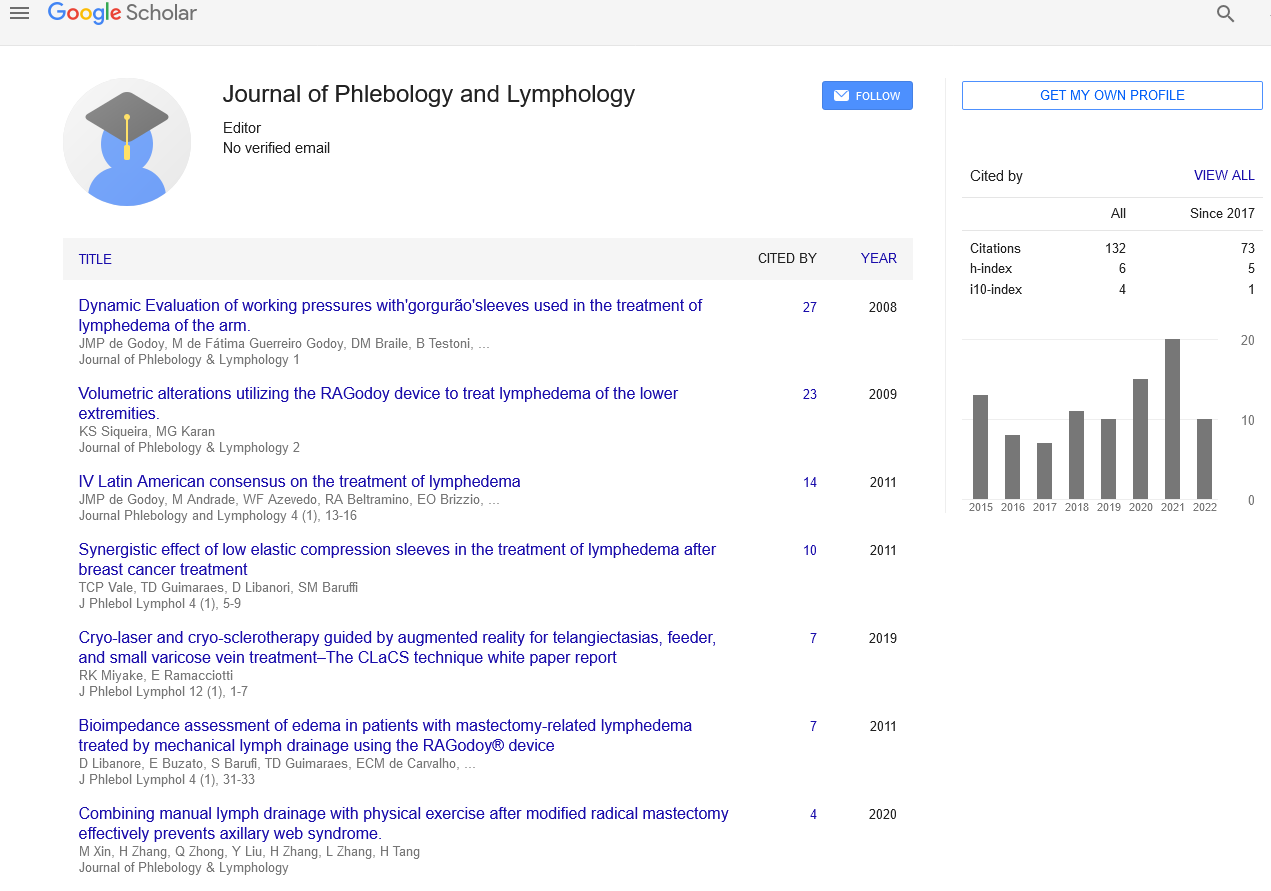Advance in lymphology: unravelling the complexity of the lymphatic system
Received: 02-Feb-2023, Manuscript No. puljpl-23-6475; Editor assigned: 05-Feb-2023, Pre QC No. puljpl-23-6475 (PQ); Accepted Date: Feb 26, 2023; Reviewed: 20-Feb-2023 QC No. puljpl-23-6475 (Q); Revised: 25-Feb-2023, Manuscript No. puljpl-23-6475 (R); Published: 27-Feb-2023, DOI: 10.3752/puljpl.2023.16(1).01-02
Citation: Iannetti L. Advances in lymphology: Unraveling the complexity of the lymphatic system. 2023; 16(1):1-2.
This open-access article is distributed under the terms of the Creative Commons Attribution Non-Commercial License (CC BY-NC) (http://creativecommons.org/licenses/by-nc/4.0/), which permits reuse, distribution and reproduction of the article, provided that the original work is properly cited and the reuse is restricted to noncommercial purposes. For commercial reuse, contact reprints@pulsus.com
Abstract
The lymphatic system is crucial in preserving tissue homeostasis and immunological function but is sometimes disregarded in favour of its more well-known counterpart, the circulatory system. Despite its significance, the topic of lymphology is still not very well understood. The objective of this commentary piece is to inform the scientific community on the lymphatic system, its activities, and current developments in lymphology research
Key Words
Lymphedema, Lymphangiogenesis ,Lymphatic ducts
Introduction
The lymphatic system is crucial in preserving tissue homeostasis and immunological function but is sometimes disregarded in favour of its more well-known counterpart, the circulatory system. Despite its significance, the topic of lymphology is still not very well understood. The objective of this commentary piece is to inform the scientific community on the lymphatic system, its activities, and current developments in lymphology research.
The lymphatic system is a complex network of vessels, organs, and lymphoid tissues that work together to transport lymph, a clear fluid containing immune cells and waste products, throughout the body. Lymphatic vessels parallel the blood vessels and are strategically located in tissues and organs, facilitating the collection and transport of interstitial fluid back to the bloodstream. Additionally, the lymphatic system plays a crucial role in immune surveillance by filtering lymph and trapping pathogens and foreign particles within lymph nodes. The lymphatic system plays a pivotal role in maintaining fluid balance within tissues. It collects excess interstitial fluid, preventing its accumulation and subsequent tissue edema. Moreover, the lymphatic system transports nutrients, hormones, and lipids absorbed from the gastrointestinal tract, ensuring their proper distribution throughout the body.Immune Function: The lymphatic system serves as a highway for immune cells, facilitating their communication and transportation throughout the body. Lymph nodes act as filtration centers, where immune cells encounter antigens, initiating immune responses against pathogens. Recent research has revealed the crucial role of lymphatic vessels in coordinating immune responses by directing immune cell migration and modulating their activation
Lymphatic Development and Morphogenesis: Recent studies have shed light on the mechanisms underlying lymphatic vessel development. Researchers have identified key molecular regulators, such as Vascular Endothelial Growth Factor (VEGF)- C and VEGF-D, and their receptors, which play critical roles in lymphatic vessel formation. Understanding these molecular pathways opens doors for the development of therapeutic strategies to promote lymphatic regeneration in conditions associated with lymphatic dysfunction.
Lymphatic Transport and Fluid Dynamics: Advances in imaging techniques, such as intravital microscopy and lymphangiography, have allowed researchers to visualize and study lymphatic vessel function in unprecedented detail. These studies have provided insights into lymphatic pump function, the mechanisms underlying lymph flow, and the interplay between lymphatic vessels and surrounding tissues. Such knowledge holds promise for developing targeted interventions to improve lymphatic transport and address conditions like lymphedema
Lymphatic Dysfunction and Pathologies: Lymphatic disorders, such as lymphedema, lymphangiectasia, and lymphatic malformations, have a significant impact on patients' quality of life. Recent research has focused on unraveling the genetic and molecular mechanisms underlying these conditions. Identifying novel genes and pathways involved in lymphatic dysfunction not only enhances our understanding of these disorders but also paves the way for potential therapeutic interventions
Lymphatics and Cancer Metastasis: Tumor metastasis, the spread of cancer cells from the primary site to distant organs, is a major challenge in cancer treatment. Lymphatic vessels play a crucial role in this process by serving as conduits for tumor cell dissemination. Recent studies have highlighted the complex interplay between tumor cells and lymphatic vessels, providing potential targets for novel therapeutic strategies aimed at preventing or inhibiting cancer metastasis through lymphatic routes.
Conclusion
The lymphatic system, often underappreciated, is a fascinating and intricately regulated network that deserves more attention from the scientific community. Recent advances in lymphology research have significantly contributed to our understanding of lymphatic development, function, and pathologies. By disseminating this knowledge, we hope to inspire further exploration of the lymphatic system and encourage the development of innovative diagnostic tools and therapeutic strategies for lymphatic disorders. Continued research in lymphology holds great potential for improving human health, from promoting tissue regeneration to combating cancer metastasis, and underscores the importance of interdisciplinary collaborations in unraveling the complexities of the lymphatic system.





